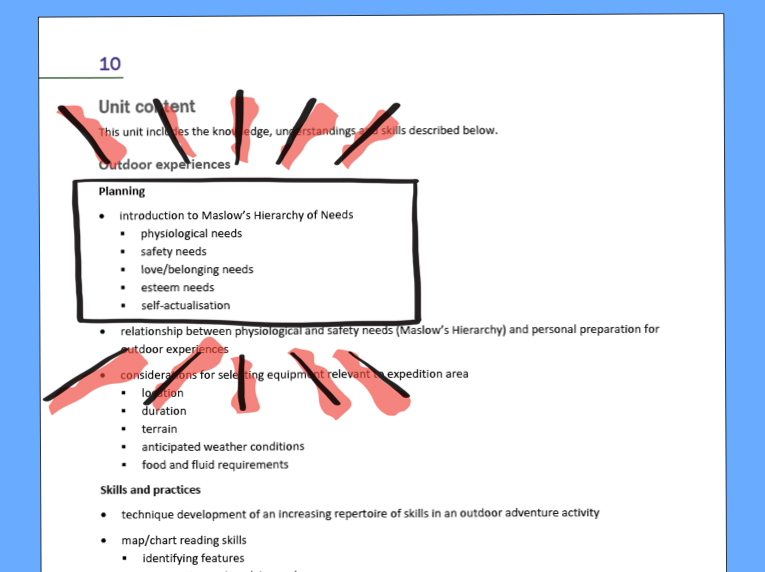
Many students spend all their time leading up to exams creating beautiful sets of notes.
In their minds:
Beautiful notes = effective exam preparation
But is this the most effective approach to take?
In her book An Insider’s Guide to BA [Bachelor of Arts] Rebecca Jury states:
“Would you sit your practical driver’s test without ever having practised driving a car? Preparing for an exam by only taking notes is like preparing for your restricted driver’s licence by only reading the Road Code. Bad idea.
You need to learn the theory and then practise in the medium in which you are going to be assessed.”
In short, if you want to do well in your exams then you’ll need to do practice exams.
The many benefits of doing past papers
When you do practice exams this . . .
• helps you see how well you understand the subject (it’s a reality check!)
• gives you the opportunity to do active recall (AKA retrieval practice)
• helps you to pinpoint gaps in your knowledge (which is 80% of the battle when it comes to learning)
• gives you a sense of the format and types of questions you’ll be asked
• helps you to build your confidence for the actual exam
But I understand the idea of gathering a pile of past papers and then sitting down to do them can be completely overwhelming.
So, we’re going to break this process down, step-by-step, so it’s not so scary for your brain.
Here’s the approach I recommend . . .
Step 1. Gather past exam papers and study guides

You can gather past/sample exam papers in the following ways:
• Talk to your teacher: This is probably the easiest way to access exam papers. Simply ask your teacher if they have any practice exams and other resources they are willing to share with you.
• Trade exam papers with other students: Reach out to someone you know at another school who is studying the same subject and do a friendly exchange of resources (although I don’t recommend trading notes).
• Visit your State library: Most good libraries have past exam papers and study guides available for students. For instance, The State Library of Western Australia has an extensive selection of past exam papers, study guides, and Good Answer Guides (visit the WACE Study Space on Level 1).
• Government education websites: If you live in Australia, most state government departments that deal with curriculum provide past exam papers online that you can download:
Western Australian: School Curriculum and Standards Authority
Victoria: Victorian Curriculum and Assessment Authority
South Australia: South Australian Certificate of Education
Queensland: Queensland Curriculum and Assessment Authority
New South Wales: Education Standards Authority
Check in with your teacher to see what papers are most relevant. You don’t want to waste your precious time and energy doing a past paper that is based on an outdated syllabus.
• Study guides: These resources are usually created by experienced teachers who are familiar with the curriculum. You’ll want to check a few details before borrowing/purchasing a study guide:
1. What year was the study guide was published?
2. What’s the author’s background and level of experience?
3. Where are they based?
It makes a difference if the author is an experienced teacher who is familiar with your curriculum.
What if you can’t access any past papers and study guides?
Then, worst case scenario, you’ll need to make your own exam paper.
This doesn’t have to be anything fancy. All you need is a series of questions that will force you to bring the relevant information to mind.
Step 2. Tackle one exam paper at a time in small chunks

Once you’ve gathered all your practice exam papers, do a lucky dip and pick one. Put all the other exam papers in another room (you’ll deal with them later).
Then, you need to commit to making a start on the practice exam you’ve just selected.
Here’s what you’ll need:
• A clear desk located in a place where you won’t get interrupted or distracted
• A timer
• Several good pens and anything else you’ll need to do the exam (e.g., calculator)
• A friend to share the pain with (optional)
You won’t need:
• Your books and notes
• Your phone
Here’s what you need to expect:
Expect to feel a little uncomfortable doing the practice exam. Chances are you won’t be able to answer several (or a lot) of the questions. You’ll probably feel a little awkward and clumsy, too. That’s okay. Relax. This is a normal part of the learning process.
Don’t like the idea of sitting for a full 2-3 hours to do the exam?
I get it! In fact, I wouldn’t recommend doing that.
It’s best to break it down into small chunks. You don’t want to slog it out in pain for hours on end. You’ll kill the habit before it has a chance to get established in your life.
So, ease into it by doing some dynamic testing. Here’s what it looks like:
• Set a timer for 25 minutes and make a start on some questions (without looking at your books and notes).
• Then take a 5 minute break.
• After your break, check to see how you went with the questions you just answered (take note of any weak areas).
• Take another 5 minute break.
• Dedicate some time and effort to improve on those weak areas (use effective study strategies to do this).
• In a few days time, test yourself again on those weak areas.
What you’re doing here is you’re using your the past papers as a tool to guide your study sessions.
If 25 minutes feels too hard, just select one question and do that. Doing one question is infinitely better than doing nothing!
Other things to keep in mind
1. The first exam paper delivers the biggest shock

The first exam paper can be a massive shock to your system. Chances are you’ll feel really rusty and you’ll struggle to answer many of the questions. This is normal.
It’s much better that you experience this shock now than in the actual exam. Stay strong and persevere through that first past paper!
2. Reward your brain with regular breaks and encouraging words

It’s normal for your brain to feel a little fried after completing exam questions. This is why it’s super important to say to yourself things like, “Great job!” and “Keep going champion!” after you finish answering each question.
Also, give your brain regular breaks. Set a timer and go do something fun and/or pleasurable. Make a smoothie. Go for a walk. Crank up some music. When the timer goes off, get stuck into answering another exam question or make a start on studying one of your weak areas.
3. Check the syllabus

Once you’ve done a few past exam papers for a subject (spaced out over a couple of weeks), you’ll begin to see common themes/topics emerge. Now is a good time to take out your syllabus. Your syllabus, specifically the unit content section, tells you exactly what you need to know for the exam.
Arm yourself with a highlighter or a coloured pen and head straight to the unit content section.
Have a read through this section. If a concept is unfamiliar to you, take note. This is an area you’ll want to look at in a future study session.
Why bother doing this?
Because you’re checking that you’ve covered all your bases. You’re future proofing yourself so there are no nasty surprises in the final exam.
To sum up
If you take this approach (i.e., doing past papers), you’ll do better than the student who spent all their time making beautiful sets of notes.
Yes, it can be a little painful and a bit of a shock to the system to do a practice exam. But remember, it’s better to experience the shock now than in the actual exam!
